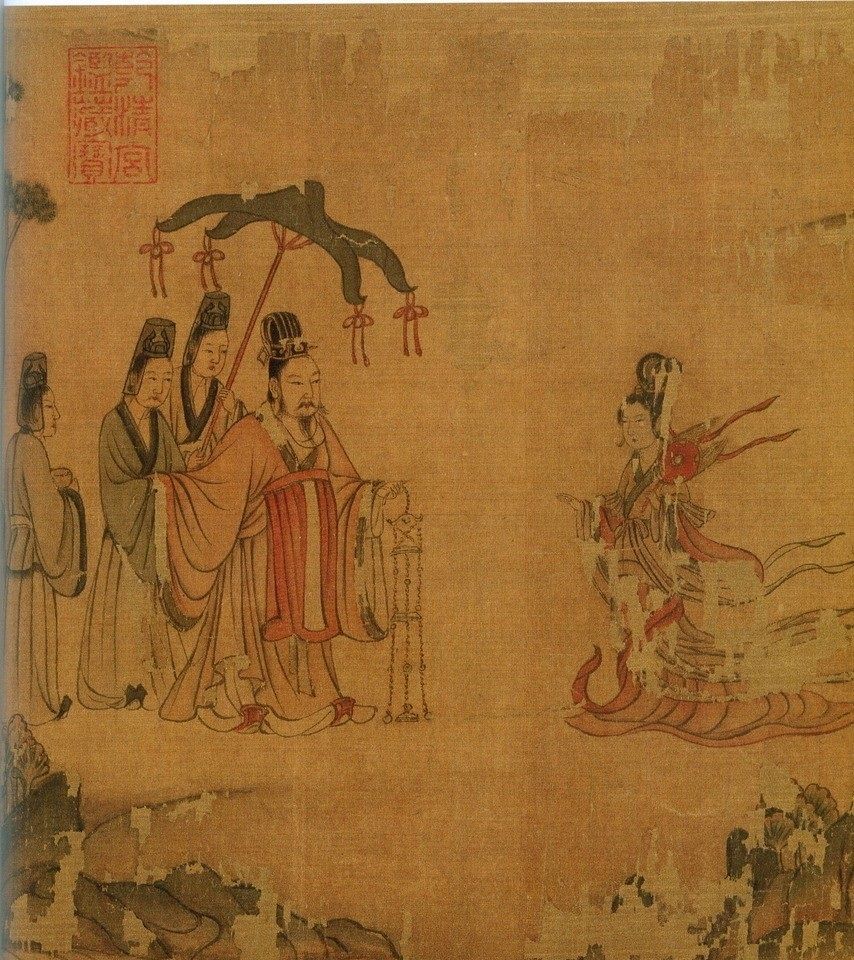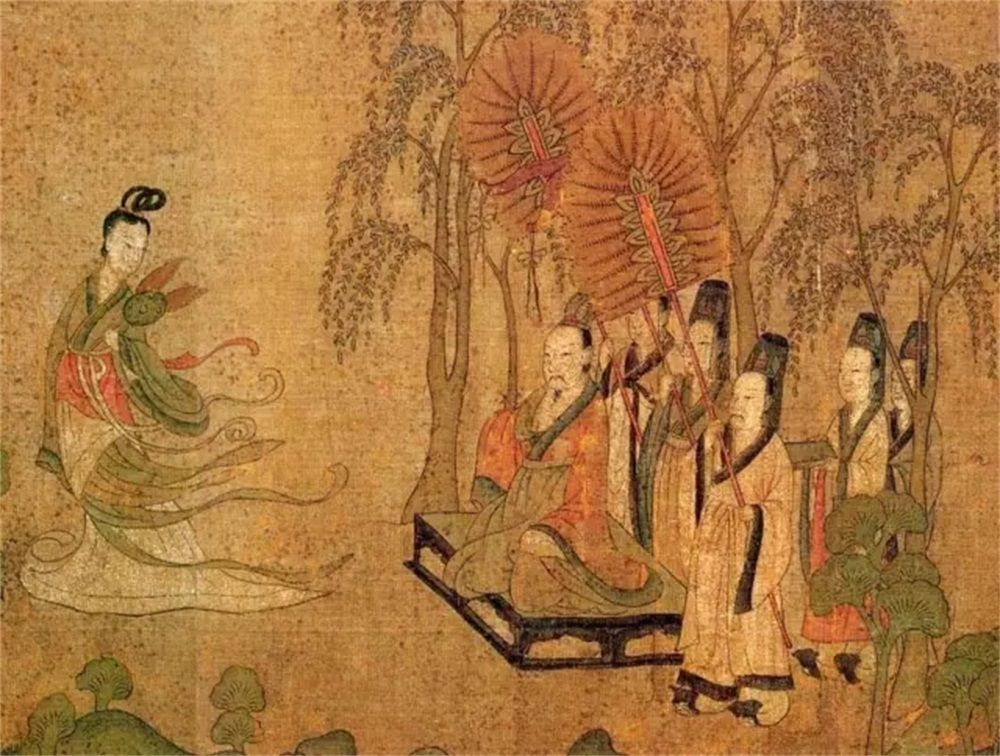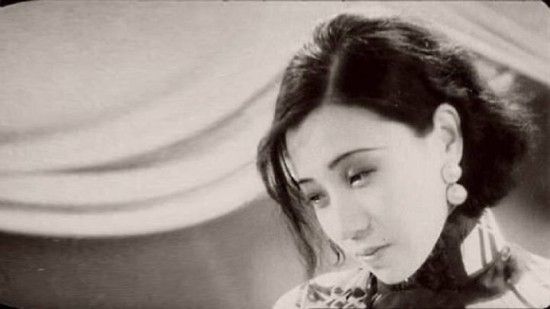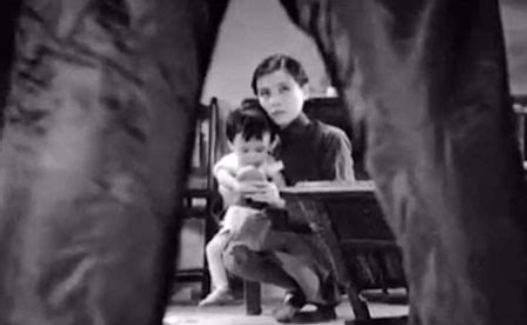The goddess is also a "tool man"
The hot word "goddess" on the Internet builds a gender "model room" in which certain "essential" imaginations of women such as beauty, elegance, and wealth are fixed, as well as the "white swan" that is "unreachable". "mean. There is also a "Goddess Contest" in Hupu Forum, which is dominated by male members. The winners of high votes are usually Gao Yuanyuan, Qiu Shuzhen, Tong Liya, etc., or dignified and gentle, or charming and sexy, or pitiful actresses.
The word "goddess" was changed by Guo Moruo from "goddess", which may be in line with the vernacular expression. Compared with the long cultural interpretation of "goddess", the connotation of "goddess" today has actually been greatly reduced. The pre-Qin literary works "Gao Tang Fu" and "Goddess Fu", the Jin Dynasty painting "Luo Shen Fu" and the Republic of China movie "Goddess", three different media, created a sequence of fields that Chinese intellectuals paid attention to with the same theme.
Under the astonishing beauty of the "tool man" goddess "not seen in ancient times, never seen in the world", what is pinned is an old political dream that is difficult to pursue, personal pain with vague ideals, and a bunch of sympathy that bears the sight of desire.
Utopia is approved by divine will
The goddess is an illusory literary image created by "Gao Tang Fu" and "Goddess Fu". The second fu took the poet Song Yu (298 BC - about 222 BC) and King Xiang of Chu (reigned 298 BC - 263 BC) as an opportunity to travel to Yunmengze.
When they traveled for the first time, they saw the ever-changing, colorful and misty colorful clouds on the Gaotang Temple. Song Yu told King Xiang that this was the incarnation of the goddess of Wushan, who "did the clouds in the morning and rained in the evening", and then told the story of the goddess entering The old story of King Xiang's father, King Huai of Chu dreaming and offering himself a pillow seat.
The second time the two revisited Yunmeng, King Xiang asked Song Yu to tell the story again. Song Yu dreamed of the goddess that night, and then described her shape and behavior in thousands of words. For example, he said that the goddess had just arrived, and the brilliant light was like the rising sun, illuminating the room. As she got closer, she was like the brilliance of the bright moon. In an instant, the style is endless, like flowers and beautiful jade. When she started walking, the embroidered dress fluttered, like a dragon flying on the clouds...
In Song Yu's pen, the image of King Xiang of Chu is by no means positive. The latter not only coveted beauty in "Gao Tang Fu", "Goddess Fu" and "Deng Tu Zi Lust Fu", but also had a luxurious and wasteful style in "Feng Fu". Song Yu wrote that the beauty is "beautiful and beautiful, and the body is beautiful", which is very powerful and intended to attract the attention of King Xiang. In "Goddess Fu", it is clear that King Xiang of Chu wanted to see the goddess, but Song Yu didn't let him see it, but he "meeted" the goddess easily.
However, Song Yu's treatment was a step behind that of King Huai of Chu. The goddess and the king of Chu Huai, Wushan Yunyu, and Song Yu "didn't meet in love". The emotional communication between the two could not fully reach an agreement. She refused at first, and then became a little angry. She showed an inviolable attitude and got up to leave, but before leaving, she showed affection and reluctance.
Zhang Gong in "The Story of the West Chamber" thought that he would meet Cui Yingying's treasure hall and sing along the wall.
King Huai of Chu in "The Family of Chu" and "Biography of Zhang Yi" in "Historical Records" has always made people feel "not very smart". He was "played on the palm of the hand" by Zhang Yi, the "Secretary of State" of Qin State, broke off diplomatic relations with Qi State, and intermarryed with Qin State. The central area of Guizhou changed Zhang Yi back to Chu, intending to take revenge, and finally obeyed Zhang Yi and made good friends with Qin. After Zhang Yi's death, King Huai of Chu broke off diplomatic relations with Qin first and formed an alliance with Qi. Four years later, he "backed Qi and joined Qin." He took him directly as a hostage and asked Chu to replace them with two counties. King Huai of Chu refused to do it, attempted to escape, and died in Qin.
King Xiang of Chu, who ascended the throne, actually indirectly caused his father's death. Qin and Chu formed an alliance, and King Xiang of Chu went to Qin as a hostage as a prince. It was very common for princes to be hostages at that time. King Qin Zhaoxiang and Qin Shihuang did it. As long as the relationship between the two countries is not too tense, you can also accumulate some contacts and political capital abroad. "Touching the Dragon Talks about the Empress Dowager Zhao" says that when the prince is a hostage, his political status will be relatively stable, otherwise "the position is respected without merit, and the honor is generous without labor", and it cannot be convincing to the public. However, King Xiang of Chu killed a doctor in Qin for personal affairs, and he was so frightened that he fled back to Chu overnight.
King Huai of Chu was worried that the north would deal with the two powerful enemies of Qin and Qi at the same time, and sent King Xiang of Chu to Qi as a hostage, while fighting against Qin. Qin and Chu fought for three years, and the state of Chu was unfavorable. King Zhaoxiang of Qin graciously wrote a letter to King Huai of Chu to meet him. The name was "Peace Talk", which was actually "house arrest". The lost Warring States period is also rare.
Qu Yuan's "Nine Chapters: Thinking of Beautiful People" expresses his complex feelings towards King Huai of Chu vividly. He couldn't stop crying. He missed and complained at the same time. He encouraged himself to revitalize the state of Chu at one time, and lost all confidence at the time. By the way, he satirized the "perverted" leadership of the state of Chu at that time. Among Song Yu's "Gao Tang Fu" and "Goddess Fu", only King Huai of Chu was favored by the goddess.
King Huai of Chu is quite popular, and he is not necessarily as mediocre as the historical "records". People in Chu want to recall the old dream of "domination" of Chu, and the early period of King Huai of Chu was the last good time. In the two battles between Danyang and Lantian, Qin did not win, Chu did not lose, and the destruction of Yue was also a very successful military operation. Moreover, he died in Qin's heinous conspiracy in the end. "Qin destroyed the six kingdoms, and Chu was the most innocent. Since King Huai entered Qin and never returned, the people of Chu have pity him to this day." The tragic story of King Huai of Chu is very marketable. "Great Chu Xing Chen Shengwang" and Xiang Yu's self-proclaimed "Western Chu Overlord" are all out of such social foundation and emotional accumulation.
The goddess is not a real woman, she is just a dream of different historical figures. It is in this hidden situation between the visible and the invisible that she uses the clouds and smoke waves, and deliberately "choose" to hint at a golden age that may have been approved and blessed by the gods. This glorious utopia is fleeting, so fleeting that it sometimes makes one wonder if it really exists.
Later generations often take advantage of this to grow. Li He's "Wushan High" so-called "Bi Cong Cong, high into the sky, the river turns the sky and the gods drag smoke. The soul of Chu seeks dreams, the wind blows, and the wind flies rain and produces moss and money", Li Bai's "Gan Xing" so-called "Yao Ji Tiandi" Female, wonderfully transforming into the clouds. Just like turning into a night dream, unintentionally facing Chu Jun", Du Fu's "Tianchi" so-called "the rain of the goddess, the wind of the king of Chu intermittently", all implies the expectation and loss of "the soul of Chu seeks the dream" . Li Shangyin's "Working on the Table" so-called "Light clouds and light rain blow in the high Tang Dynasty, and the autumn is coming and the night is growing in the jade palace. It is expected that Song Yu should also be pity, and he will serve King Xiang of Chu all his life." "self-projection.
"Gao Tang Fu" and "Goddess Fu" also reflect a "time trend", the praise and praise of women, on the one hand, still has the "traditional" function of stabbed the king, pointed out the bad times, and nostalgic for the past, on the other hand, it is also extremely The gorgeous brush strokes are used to describe the gorgeous female beauty, even if it seems a bit contradictory - it not only emphasizes the importance of etiquette and morality, but also reiterates the irresistible physical attraction of the goddess.
Loneliness is often "in the name of love"
"Wushan Yunyu Luochuan God."
Cao Zhi wrote "Luoshen Fu", which echoes "Gao Tang Fu" and "Goddess Fu". , "I feel Song Yu's affair with the goddess of the king of Chu", a lingering emotional experience with the goddess of Luoshui.
Among them, "it looks like a frightening bird, graceful like a wandering dragon", "Rong Yao Qiu Ju, Hua Mao Chun Pine", "It seems like a light cloud covering the moon, fluttering like a flowing wind returning to snow", "From a distance, it is as bright as the sun" Sentences such as "rising to the dawn of the morning" and "observing it under pressure, burning like a hibiscus with green waves", are as beautiful and colorful as "High" and "God".
Fu style poetry emphasizes description, and gradually began to have a relationship with visual art. "Luo Shen Fu Tu" by Gu Kaizhi (AD 348-409) of the Jin Dynasty is a perfect presentation of "Luo Shen Fu". Moreover, the paintings integrated with the latest visual techniques "overflow" the original literary works to some extent. The scope of expression makes "Goddess" contain more content of the times - abandoning Confucian moral teachings, and expressing love, desire, and personal spiritual pain behind "in the name of love" from a "movement perspective".
Gu Kaizhi's original work has long been lost, and only a few copies have survived. The two most famous volumes, collected in the Palace Museum and the Liaoning Provincial Museum, were both copied and painted in the Song Dynasty.
In "Luoshen Fu", Cao Zhi saw Luoshen in a trance, but his attendants could not see it. As the only "spectator", Cao Zhi wanted to describe the state of Luoshen for others. In the two "Luoshen Futu", only Cao Zhi looked straight ahead, and the others bowed their heads slightly, their eyes drooping, as if they were listening carefully to Cao Zhi's words. This performance is very crucial: when viewers continue to open the scroll to appreciate, what they follow is actually Cao Zhi's line of sight, and the entire "encounter" is Cao Zhi's illusion of "moving his mind and suddenly thinking about it". , that is, this dream that is bound to disappear.
"Luoshen Futu" also distinguishes between the "real world" where Cao Zhi lives and the "unreal world" where Luoshen lives. The former has been standing on land, while the latter has been floating above the river; her image also follows the river. The flow of art is ever-changing, leading Cao Zhi and the viewer to appreciate the unknown situation on the left side of the line of sight (ie, the front).
Liaoning Ben specially showed the "gift" link. Cao Zhi took off the jade pendant and gave it to Luoshen, who returned with Qiongyu and accepted his feelings. In this scene, Luoshen appeared on the right side of Cao Zhi for the first time. Before that, she was the object of attention followed by Cao Zhi on the left side, which changed the previous status of "being watched" and became the dominant "watcher" ”; For the first time, he left the river water range, landed on land, and entered “reality”.

At this moment, Luoshen's belt flying horizontally means that she is walking towards Cao Zhi. Her right hand pointed at the poet, as if expressing her intentions. The active position and initiative of Luoshen form a sharp contrast with the passive poet on the left side of the picture-his hands are stretched out to the sides and behind him, supported by the attendants, and his posture is steady.
This is the narrative turning point of the text of "Luo Shen Fu". When Luoshen gave Cao Zhiqiongyu the jade, he "referring to Qianchuan for a period of time", hoping to meet under the abyss. This unreasonable location suddenly made the poet full of doubts. He remembered the precedent of the goddess "coming in empty words and disappearing", worried that he would be fooled, and immediately stated a set of norms for men and women to defend in the tone of a Taoist. At this time, Luoshen's reaction was very strong, the divine light surrounding her flickered, like a crane, it seemed to fly away, and then stopped, suddenly she let out a long, mournful moan, which echoed in the air for a long time.

The picture of "Luoshen Futu" returns to the original "being watched/watched" relationship where the Luoshen is on the left and the poet is on the right. The advancing Luoshen looks back at the poet, and the poet watches her away. There are differences between people and gods, and it is difficult to get what you want. This is Luoshen's rational summary of this fleeting feeling before leaving, but here is a different place, and there will never be a day to meet, Luoshen can't hide his sadness, and the rolling tears are wet clothes.

After Luoshen disappeared, "Luoshen Fu" only had 36 words to describe the poet's loss of soul in the three scenes of boating, sitting at night and riding in a car. It was less than 1/25 of the full text of 984 words, but "Luoshen Futu" was created for this purpose. Three continuous pictures, the length reaches 1/4 of the whole picture. The painter's treatment of lengthening the scale of the painting emphasizes the sense of distance and loneliness after the separation of the poet and Luoshen, as well as the guilt, regret and loneliness that have nowhere to be relieved.
In the three scenes of "Going up the river", "Insomnia at night" and "Returning to the country by car", the structure of the building boat is clearly recognizable, the green hills, green trees, and river water are clearly visible, and the attitudes and movements of the maids, boatmen, and knights are different. These objects or people "encircle" the poet in the center of the picture, and drag him into the distance. The poet is always expressionless, looking straight, not focusing on any particular thing. Luoshen has left his life, and all personal past events and feelings have also drifted away. The sadness of "reciting the long, lonely and weeping", the loneliness and pain as long as the road, the inexplicable regret and melancholy that cannot be avoided, are the "overflow" expression of the three pictures compared to the poems. This emotion has already surpassed love and desire, and has inspired long-term thinking about the fate of the individual.
At the end of the picture scroll, Cao Zhi's car was galloping forward to the left in front of the guard's guard, and he looked back in the car, as if to retrieve the lost dream. This "look back" action is similar to the "Nv Shi" turning back at the end of Gu Kaizhi's "Nv Shi Zhu Tu", which seems to lead the viewer to appreciate the picture scroll in reverse, and relive those charming or cruel life moments in memory.
Noble and lowly in one
After the Han, Wei and Six Dynasties, the word "goddess" became erotic. "Wushan Yunyu" refers specifically to romantic affairs, "Wushan Girl" and "Luochuan God" in the palace poems of the Tang Dynasty, "then are often used for coquettish women, or the name of the female Taoist priest who is exiled and exiled. prostitutes". Most of the "goddesses" after the Tang Dynasty were elegantly called "prostitutes", which also shows the social status of women who "recommended pillow seats" in mainstream culture.
The film "Goddess" by Lianhua Film Company was released in 1934. After the "September 18 Incident", the Kuomintang ended the state of division between Nanjing, Guangdong and Shanghai, and started institutional construction with the attitude of a "unified party". Mass entertainment, especially "Shanghai Modern"-style urban cultural consumption, has developed by leaps and bounds. , the early left-wing films were born at this time.

The silent film "Goddess" is about a single mother, Sister Ruan (played by Ruan Lingyu), who raises her young son as a prostitute and is forced to live with a scoundrel. She secretly saved money to "change fate" for her son to go to school. Other parents wanted the "prostitute's child" to get out of the school, but the principal tried to no avail, and Ruan's only savings was lost by the rogue's gambling. She killed the rogue in anger and went to jail to face trial. Similar films were not uncommon in Shanghai in the 1930s. In 1934, Ruan Lingyu starred in "Life", and in 1930, Zheng Zhengqiu directed "Promote a Family and a Good Mother", all concerned with the same image.
At the beginning of the film, the dual identity of the goddess is pointed out - "struggling in the vortex of life. On the streets of the night, she is a lowly goddess. When she holds her child in her arms, she is a holy mother. In life, she showed a great personality." Mother means "reproduction", ethics, nobility and sacrifice; prostitute means "happiness", curiosity, debauchery and lowliness. When the goddess wanted to "naturally" switch between these two identities, a strong emotional conflict broke out.
The lens language divides the dual roles of the goddess into two different time and space. In several "gazing" empty shots, when everything related to family and children appears, the light is bright and soft, and the time is daylight. The goddess went to the street to "seek customers", was chased by the police, and fled to the rogue's house to hide. It all happened in the night when the neon lights were flashing.
Four males shaped the life of the goddess. Her husband, the "absent father" of her son, determined her poor and helpless situation, and the "no sponsorship and no recommendation" recruitment conditions made her only a private prostitute. The rogue followed her, seized her, and gambled with her money. After finding out that her son's future was also ruined by the rogue, the goddess committed an impulsive crime. The fate of the son is the basis of all choices made by the goddess. The principal sympathized with the goddess, insisted on the belief that the educated were equal, and promised to take care of the goddess after her son was imprisoned, and was the "savior" in the whole incident.
Like the previous "Goddess", the body posture of the "Goddess" in the movie is just as interesting. When she learned that she had to commit herself to the rogue, she sat on the table with her feet raised, asked the rogue for a cigarette, and then spat the smoke rudely and provocatively at the rogue. The disdain is because the rogue is not qualified to be her "guest"; the self-satisfaction is also quite confident in her appearance, figure and charm. When her son came back from school, he must teach her to do gymnastics. She laughed until her eyes were crooked, her hands and feet were always uncoordinated, and finally fell to the ground. She hugged her son and laughed together. That was her happiest moment in the film. The decent "new life" represented by her son made her excited and shy, but her body with "original sin" could not directly adapt to it.
"Goddess" shows the complex relationship between women's bodies, money and commodities. In the modern metropolis of Shanghai, goddesses use their bodies as commodities and sell them for money. "The prostitutes who are also mothers, commodities, and sex workers have really become gods." After sending her children to study, she looked at the night in Shanghai and looked forward to a bright future, but this "future" just obeyed the "logic of things" that bought her body, and obeyed the cultural concept of "the children of prostitutes destroy the reputation of the school". . The identity of a mother cannot fundamentally save her from being abject, and the identity of a prostitute cannot be forgiven by the money society because it conforms to the "logic of things" of "exchanging money". Her son leaves his mother, hates her mother, and may not be able to get the guarantee of "future" and the acceptance of society.

In a dislocated shot, through the legs of a standing rogue, the thin and helpless Sister Ruan squatted down and hugged her young son. The rogue body, like an immovable mountain in the foreground, the goddess and the child can only bow their heads in overwhelming control. A close-up is that after the goddess was imprisoned, the principal came to visit, across the railing, he stretched out his hand and patted the goddess on the shoulder lightly. This move is not pornographic, but it is not entirely necessary to comfort the other person with such an action.
The street lights at night stretched the shadow of the goddess very long. Like the goddess Wushan and Luoshen, Sister Ruan lives in the long shadow. The predicament women face in society is that men determine the boundaries of desire and chastity, and write the difference between subject and object.
Shu Ting's poem "The Peak of the Goddess" (1981), "It is better to cry all night on the shoulder of a lover than to exhibit on a cliff for thousands of years", but doubts the necessity of "big history", while still longing for an individual, "reliable" shoulders. The "Golden Rooster" of the game life (played by Wu Junru, the movie "Golden Rooster" in 2002), even if she is used to the wind and moon field, her spiritual support also comes from numerous male "guests". At the end of the film, she received a huge sum of money, which can be counted A Dumas-style dream. And the film "Three Husbands" (2018), one of Chen Guo's "Three Prostitutes", is blunt and vulgar, and cannot be separated from the evil taste of women's physical exposure to political storms.
The sixth "Goddess Competition" of Hupu in 2021 will be almost silent. This community discussion, mixed with stereotypes and commercial marketing, has gone from social nostalgia (the average age of the previous five champions is 43 years old) to outright "self-healing". Those eyes aimed at women condensed the wishes, lust and imagination of men, leading directly to history, while the goddesses who piled up beautiful rhetoric have become more long footnotes in history.
Like my work? Don't forget to support and clap, let me know that you are with me on the road of creation. Keep this enthusiasm together!

- Author
- More